Published in the Boston Globe on May 1, 2025.
At the Grannies International Football Tournament in South Africa, a chance to prove any doubters wrong.
By Ryan Lenora Brown
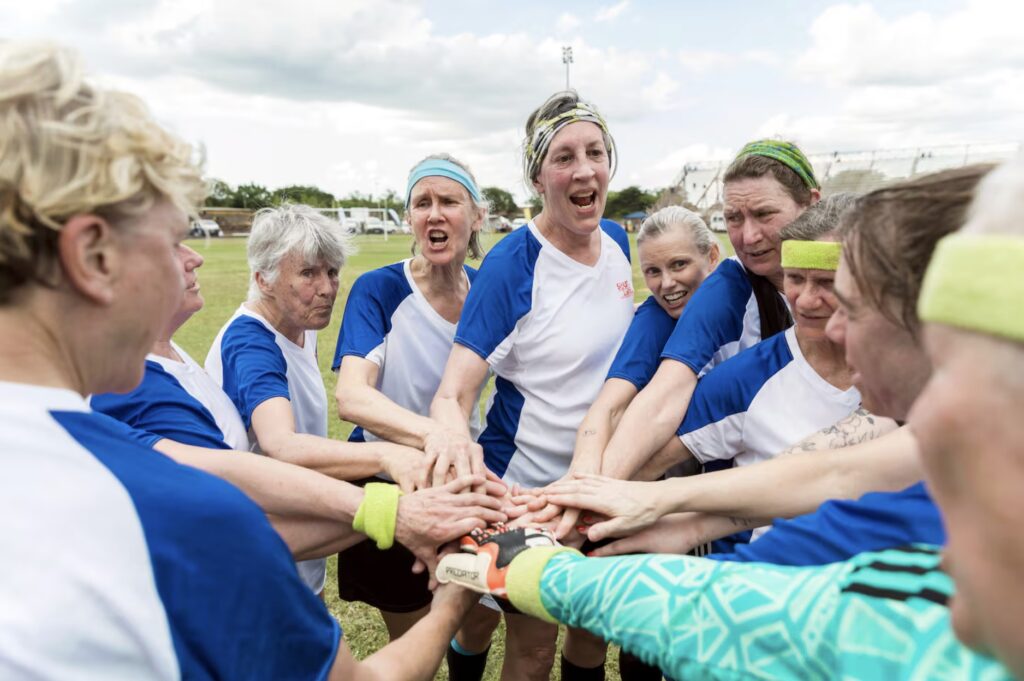
The starting squad of the New England Breakers stands on the center line of a soccer field in Tzaneen, South Africa, arms slung over one another’s backs, bouncing nervously on the balls of their feet.
On this humid April day, hundreds of fans have risen from their grandstand seats, yelling with voices scratched raw from four days of cheering. A chorus of vuvuzelas wails in the background. The commentator screams over a loudspeaker. The crowd drowns him out.
Everything comes down to this: the deciding shot in the final game of the international tournament that has brought the Breakers from Massachusetts to this scruffy South African farming town half a world away.
Four days ago, there were 19 squads from seven countries in the running. Now it’s down to the Breakers and a French team called Les Z’amies Foot, the Football Friends, with a penalty shootout to determine the champion.
None of this seems real for these New England athletes, who, not long ago, were whacking chunks of ice off a field at Needham’s Memorial Park so they could play pickup games no one watched, whose scores no one would remember.
Since arriving in Tzaneen, they’ve been treated like professionals, marching onto the pitch to the chords of the FIFA anthem, an American flag held high in the air in front of them. The stands have been packed. “She’s the USA’s Messi,” the commentator exclaims during one game as Breakers forward Pam Woodworth shoots past three opponents with quick, tight dribbles.
The difference — one of them anyway — between the Argentine legend and the American, formerly of Newton and now living in New York, is more than three decades. Woodworth, who pulls her bright white hair in a ponytail, is 72. One-third of the Breakers lineup is over 70, and none is younger than 50. And this is not the FIFA World Cup — it’s the Grannies International Football Tournament.
France’s kicker walks slowly to a spot 12 yards from Breakers goalkeeper Chris Matson, a 68-year-old from Belmont. The referee sets the ball on the grass; Matson drops into a crouch, palms outstretched. The whistle blows.
The New England Breakers arrived in Tzaneen four days earlier, after some 20 hours on a plane from Logan International Airport and five hours on a bus from Johannesburg. Traveling with them were the Soccer Sisters, another Massachusetts team.
Though technically opponents, the teams are, in reality, one entangled group of women who play together in local leagues and pickup games. They’ve bonded over the years, sometimes while getting thrashed by teams half their age.
On the way to Tzaneen, they drove past orange groves and baboons galloping across the road. Some were seeing South Africa for the first time. Others had been to Tzaneen for the first Grannies International back in 2023. And a few had a history with their South African counterparts that went back even further.
The tournament is the brainchild of Beka Ntsanwisi, a 57-year-old Tzaneen gospel radio host who, in the mid-2000s, started a team for “grannies” as a response to the stress, poor health, and loneliness she saw plaguing older women in her community. Many of them were raising grandchildren orphaned by AIDS, or who were left at home when their parents went to work in big cities.
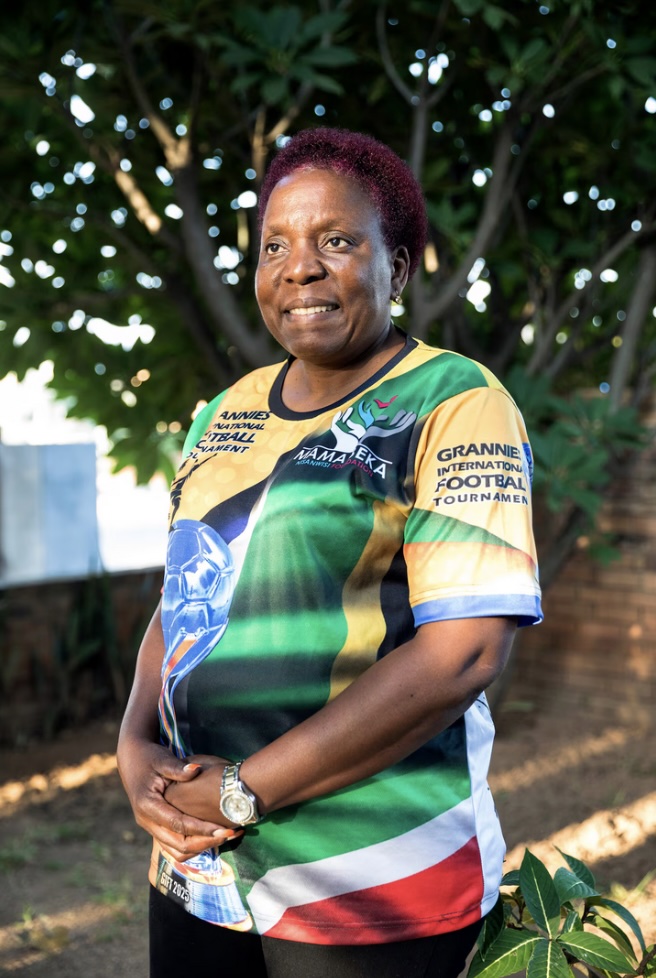
The squad became a feel-good story in the run-up to the 2010 FIFA World Cup in South Africa. It was then that Jean Duffy came across a news story about Ntsanwisi’s work.
By that time, Duffy — an engineer from Somerville — had been playing for a few years in what she and her teammates half-jokingly called “soccer for soccer moms.” Indeed, many of them had coached and watched their kids in youth leagues. But now, they were getting off the sidelines and onto the field.
Inspired by the news coverage, Duffy and her teammates extended an invite to Ntsanwisi. Five months later, a team of South Africans — many of whom had traveled farther on the bus ride to the Johannesburg airport than they ever had before — arrived in Massachusetts for the Veterans Cup, a national tournament for older players.
Though Ntsanwisi doesn’t play herself, she made a promise to herself on that 2010 trip, which Duffy recounts in her book, Soccer Grannies: The South African Women Who Inspire the World. Ntsanwisi’s players were now seeing the world. One day, she wanted to bring the world to them.
Thirteen years later, when Ntsanwisi hosted the first Grannies International in her hometown, teams from six countries showed up, including the women from Massachusetts.
When the doors of their bus hiss open at the start of the 2025 tournament’s parade, the New Englanders step into a veritable United Nations of knee braces, artificial hips, and boisterous national pride.
There are the Togolese in elegant, floor-length dresses. The Kenyan squad looks like a group of retired marathoners, lanky and fit. The French don red scarves and tapered track pants. The South African teams arrive in bright three-piece suits or beaded skirts or huge Afro wigs in the colors of their national flag.
The Americans know their circumstances are starkly different from many of their opponents. When the South Africa grannies began to play some 20 years ago, it scandalized their town. The players hid their uniforms under traditional skirts to avoid the judgment of perturbed men. Local drivers nearly got in accidents craning their necks to see what was happening on the field.
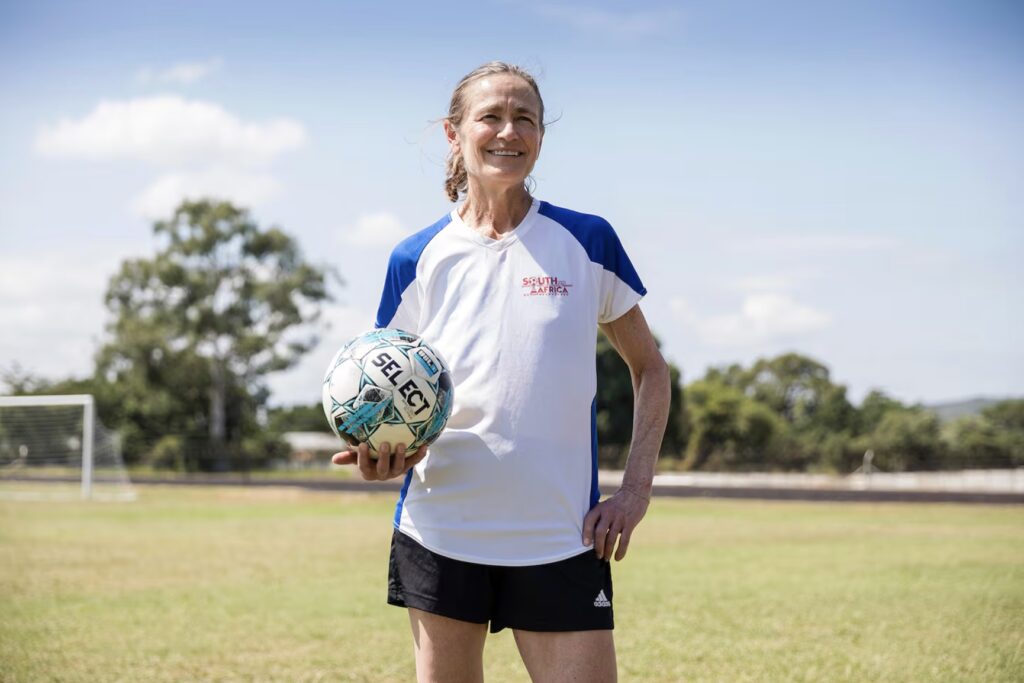
Duffy, 66, and her teammates haven’t lived through that, exactly, but they too know what it’s like to move through a world that asks them to swallow their ambitions. She had spent her working life as one of a few female engineers in a pack of guys, moving up the career ladder but at the same time, “always questioning, just being careful what I said,” she recalls.
Her teammate Elaine McCabe, 57, describes being treated by her colleagues in a paper mill “like a porcelain doll.” And so, the Westborough resident says, “I had to pretend to be that.”
In Tzaneen, the teams mill around the starting area, taking photos and singing their team songs. Veterans from the Massachusetts squads know the routine from their last trip here, and have come prepared with a song of their own.
“We’ve traveled a long, long way to South Africa,” they sing loudly as the parade begins to move. “We’re finding it beautiful, the people and the place.”
Later, the Soccer Sisters square up in the sticky heat against the Dikgoshigadi Grannies of South Africa. Just before half-time, Lee Ann LaRue takes a free kick. It ricochets hard off the post. Kari Anderson neatly slots it away.
“GOOOAAALLLLLL!” screams the commentator.
On Day 2 of the tournament, the Breakers take the field against an inexperienced squad from the West African country of Togo. The players’ shoulders seem to slump lower and lower with every American goal.
But as soon as the final whistle blows, players break into smiles and sweep one another into hugs, giggling as they chatter back and forth, despite their different languages. They bunch together for selfies and swap souvenirs they’ve brought along from home: floppy sun hats with an American flag pin attached in exchange for keychains with the Togolese flag.
Meanwhile, the local teams introduce their visitors to the art of South African soccer spectating. Frequently, and without warning, someone breaks into song — that soon has the entire crowd on their feet, stomping and clapping along.
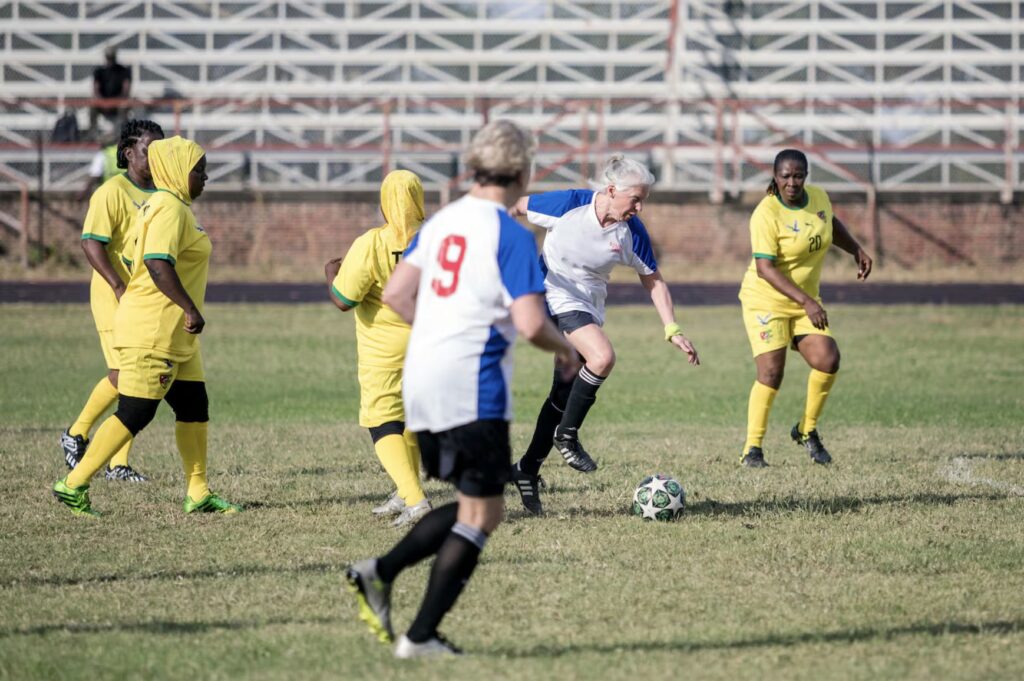
“Soccer is a very addicting sport and part of it is this social aspect,” says Breakers captain Deb Keohan of Bedford. “You get to know wonderful people who you maybe wouldn’t come across any other way.”
Later that day, Duffy chats in the stands with a small woman with bright blue eyes named Rossina Mathye — one of the South African players who traveled to Boston in 2010. Now 84, she has retired from competitive soccer but still loves to cheer her team on.
Mathye says soccer carried her through one of her darkest moments, the death of her adult son in 2015. At home, she couldn’t escape his memory. But when her teammates coaxed her out to the soccer field, she found respite from the grief, at least for the length of a game.
Her story mirrors those of other players. When your world feels like it is collapsing, your teammates are still there. Your Friday pickup game is still there. And out on the field, there’s no space to think about anything else.
“You see the ball,” she says, “not the trouble.”
On the Tournament’s third day, real life breaks into the fairy tale.
The Massachusetts teams may have arrived in South Africa thinking of themselves as merely a bunch of older women from the Boston area, but little by little, it’s become clear the situation is more complicated.
“I wasn’t thinking about the fact that I was representing the US until suddenly I was,” says Mary Lou “ML” Dymski, 70.
And representing the United States, at this moment, feels fraught for some players.
In February, President Donald Trump had issued an executive order halting aid to South Africa, claiming “unjust racial discrimination” against the country’s white Afrikaner minority, including the confiscation of land without compensation. He’s also repeatedly alleged that Afrikaner farmers are being murdered on a “large scale.”
Both claims, frequently pushed by far-right groups, have been debunked. A new law allows for land expropriation, but experts say this only happens through a formal process in line with South Africa’s constitution that offers opportunities to challenge the action. South Africa’s president has said no land has been confiscated. Meanwhile, there is no clear evidence white farmers are murdered at rates higher than other citizens in the high-crime country, and a South African court has dismissed any claims of white genocide as “clearly imagined.”
In Tzaneen, which is located deep in South African farming country, the US president’s actions have not gone unnoticed. At the opening ceremony, a local leader thanked the Americans for coming despite the political tensions.
“I hope they will go back and tell their fellow Americans that what we hear on Twitter or wherever, it’s not how the people of South Africa are,” says Phophi Ramathuba, the premier of Limpopo Province. “It’s rubbish.”
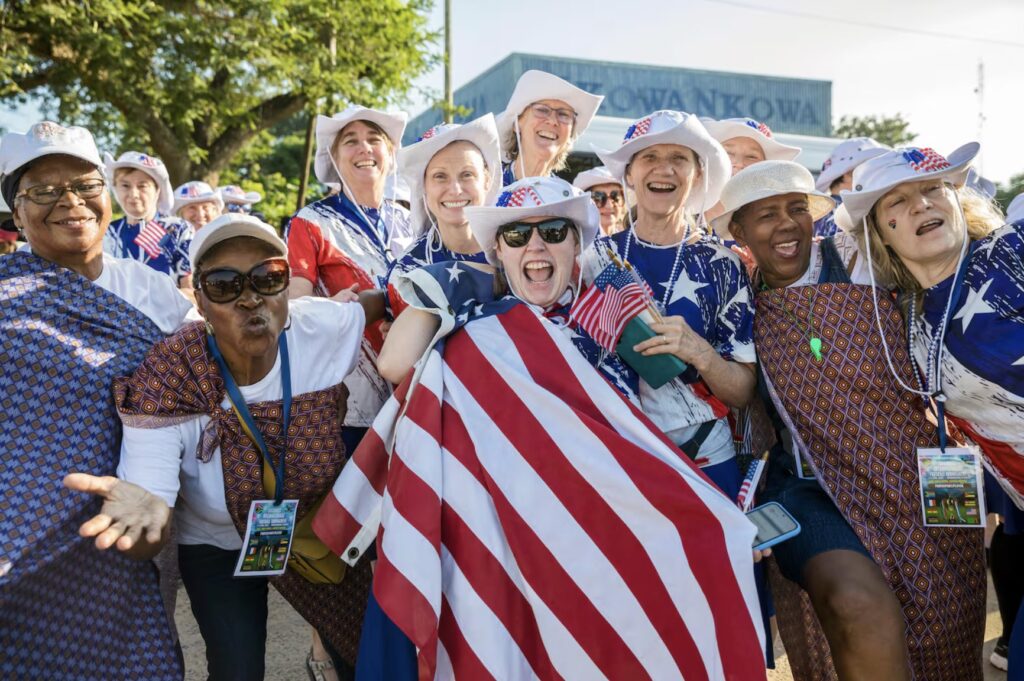
No one is prickly to the Americans, but a few people mention they are afraid of what the aid cuts will mean, especially for South Africa’s AIDS response. Heather Broglio of Lincoln, the Soccer Sisters’ goalkeeper, finds all this distressing. “We’re playing a tournament of worldwide good will with all the other grannies, and there’s such a human cost for the agenda that the Trump administration has been rolling out around the world,” she says. “I just really felt the need to do something.”
Ahead of the Soccer Sisters’ quarterfinal match, she tells Duffy she wants to take a knee during the US national anthem. Duffy immediately decides to join.
Before the Soccer Sisters enter the tunnel to walk onto the field, Broglio asks them to circle up, and she tells them her plan.
Not everyone is supportive. “I was pissed,” teammate McCabe recalls, a message she conveys in no uncertain terms. Her father was a veteran, and she’d grown up with a reverence for the flag and the anthem that transcended politics. To her, such a display is disrespectful, pure and simple.
Two more players, LaRue and Suzanne Scarlata, decide to join the protest. As the opening bars of “The Star-Spangled Banner” crackle through the stadium speakers, the four women each drop a knee to the grass.
They stay there for the rest of the song, hands on their hearts, singing loudly.
The two American teams face off in the semifinal on the fourth and final morning. The field squelches from an earlier rainstorm, and possession swivels back and forth. Dymski, who plays for the Breakers, declares the match “wicked hard.” In the end, her team breaks the 0-0 tie in a penalty shootout.
A few hours later, the Breakers take the field against the French team. Their opponents are strong, fast, and mostly in their 50s and 60s. But the Breakers manage to frustrate their offense, holding the grands-mères to a 0-0 tie.
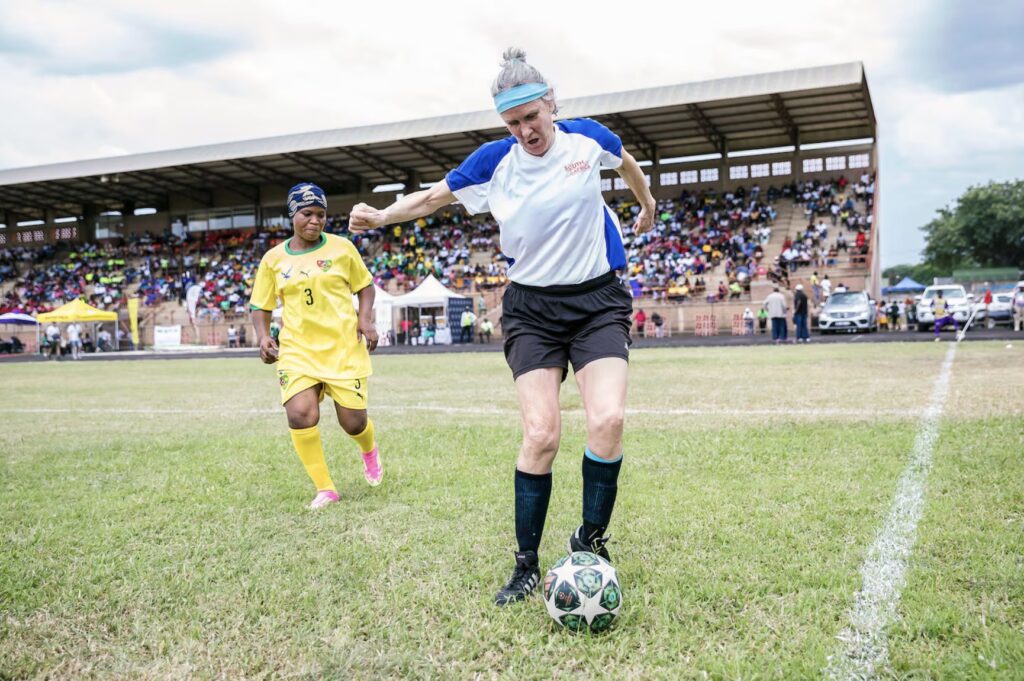
That leaves the game to be decided, again, on penalties. The first three Breakers players knock in their shots easily. But a save by the French keeper gives their opponents an opening.
When the Breakers’ Margot Rendall steps up for her kick, the shootout is locked in a tie. The 67-year-old from Newton drives a hard ball toward the left post. The keeper dives, but it sails over her into the net.
That means that if the other team misses their next shot, the Breakers win.
The French player strides forward. She fiddles with the ball and sizes up Matson, the Breakers keeper, then backs up to take the kick.
It goes wide.
As the Breakers run down the field to embrace Matson, the French women gather themselves to shake the Americans’ hands. One of their trainers kneels on the ground, sobbing. With all the tournament’s bonhomie, it’s easy to forget that the teams all came here to win. Losing — especially like this — is a kick in the chest to the French.
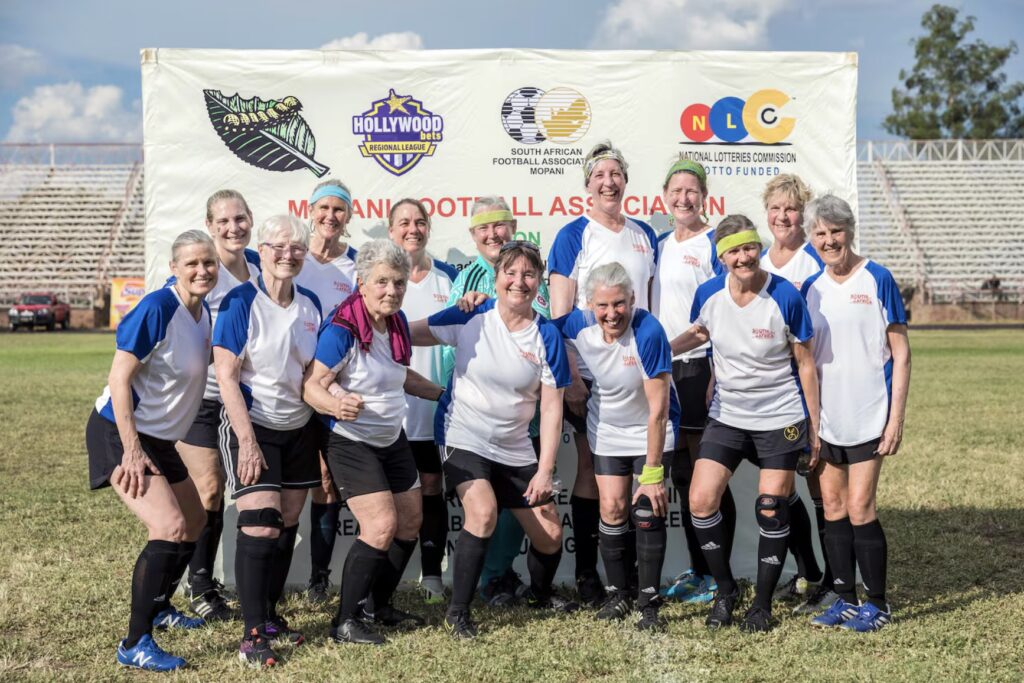
But a few minutes later, Breakers players begin dancing in a circle near their bench as a catchy song blares around them. Passersby join the reverie, including a woman from the French squad. Her shorts streaked with mud from a hard tackle, she dances in the center of the Americans’ circle with a huge grin on her face.
In this moment, she looks just like the women celebrating around her — as if she simply cannot believe her luck.
Ryan Lenora Brown is a journalist based in South Africa.